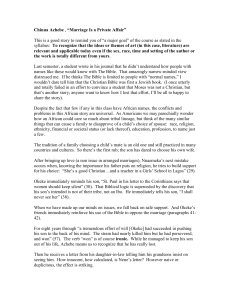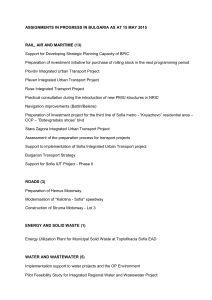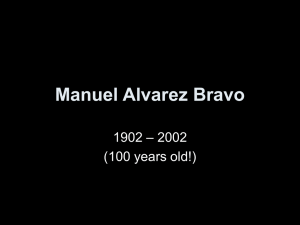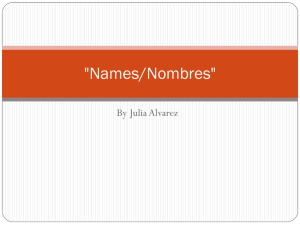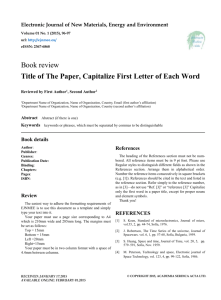Mending the Gaps and conflicts between generations
advertisement
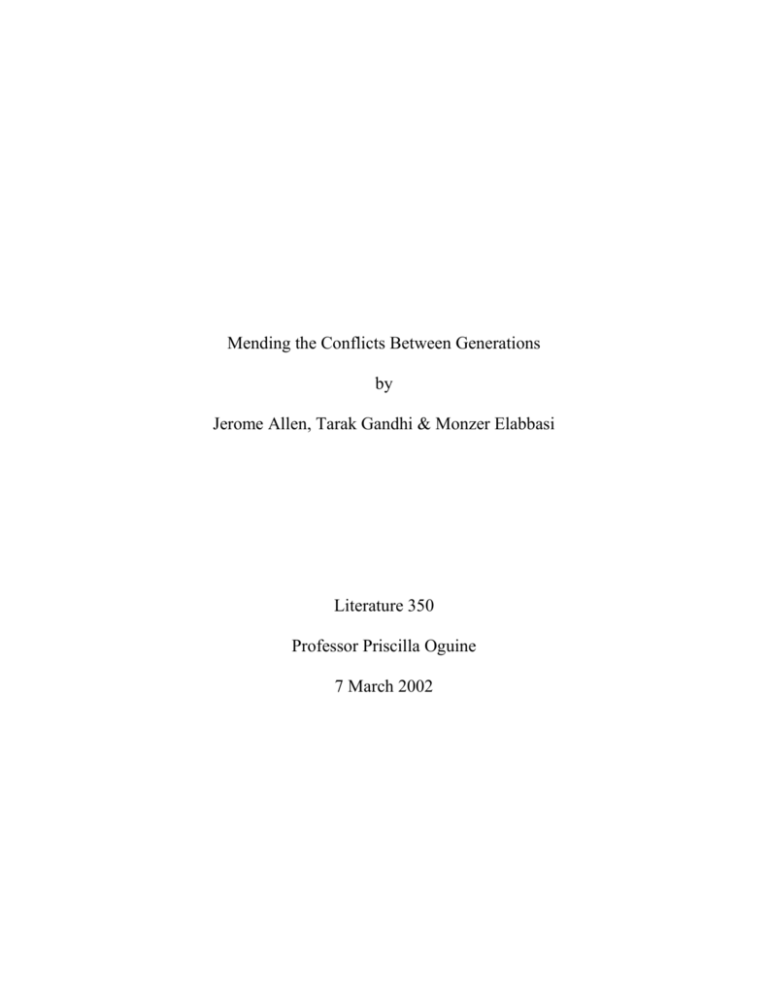
Mending the Conflicts Between Generations by Jerome Allen, Tarak Gandhi & Monzer Elabbasi Literature 350 Professor Priscilla Oguine 7 March 2002 As a family’s lineage develops, there may be apparent differences in the way of thinking, attitude, and devotion to tradition between the generations. These differences or developments can either build up friction between generations, or in some cases ultimately heal the discord between other generations. Both Julia Alvarez’s contemporary short story, “The Kiss,” and Chinua Achebe’s classic “Marriage Is a Private Affair” reveal the conflict that can erupt when one generation of a family diverges from its traditional or family values. Both accounts display differences in the way of thinking of the conflicting parties and touch upon the aspect of healing their generation gap by offering some kind of appeasement. There is the major theme portrayed in both stories. In each, there is a forbidden marriage that comes about as a result of children disagreeing with and hence rebelling against the traditional customs or values of their family. The major protagonist in each account coincidentally is the father who goes to great extents to estrange the rebellious offspring. Despite the fact that each story is written within a different era and culture, they both exhibit the dominant male figure as the family head, with very little or no input on what is right for the family from any other member. The paternal figures are strongly opinionated and do not waver from what they believe should be the proper behavior of their children, resulting in conflicts between Papi and Sofia, and Okeke and Nnaemeka. Foreshadowing of the main conflict in “The Kiss” is evident when Papi cautions his daughters by exclaiming, “I do not want loose women in my family”(Alvarez 491). This hints that that would be the reason for his falling out with his daughter, Sofia. As the story unravels not only does Sofia take off to NewYork to have sex with her boyfriend, but she also runs off and gets married without her father’s consent. Also, in Achebe’s story, foreshadowing surfaces in the first couple of sentences. Nnaemeka tries to explain to his fiancé, Nene, that it would be better for him to break the news of his engagement to his father in person rather than by letter. His tone gives the impression that his father, Okeke, would not approve of his decision. Later on in the story, the readers understand how adamant Okeke is about Nnaemeka marrying a woman chosen for him from their cultural background. So, the conflict that develops in each story seems to be a direct result of the divergence in the way of thinking of the protagonists from their parents, especially their fathers. In “Marriage Is a Private Affair,” Nnameka believes that he should fall in love before he gets married. He believes that love knows no boundaries; therefore, tribe and culture should not play a part in choosing his wife. This concept is too modern for his father who believes that the criteria for picking a good wife are that she is Ibo, a Christian, and someone the family knows. So, when Nnaemka announces that he does not love the woman his father has chosen for him, Okeke simply replies, “Nobody said you did. Why should you?”(Achebe 245), as if love had no place in marriage. Nnaemka’s attempt to explain to his father that marriage is different in his generation proves futile. Similarly, in “The Kiss” the rebellious behavior of the youngest daughter, Sofia, is more in tune with the modern time, and conflicts greatly with the strong family values that her father tries to instill in his daughters. Sofia is ahead of her time in the late sixties “when wearing jeans and hoop earrings, smoking a little dope, and sleeping with classmates were considered political acts against the military-industrial complex”(Alvarez 490) associated with many family values. Kids are becoming more open to different things, as a result, are rebelling against convention. This conflicts greatly with the decent, homely values that Papi believes are appropriate for his young women. The suspicion that one of his daughters was having sex while still living under his roof makes him so furious that his attempts at policing her, only lead to more conflicts and to her leaving home finally. Furthermore, both Alvarez and Achebe use symbolism quite effectively to show how the introduction of the third generation, the grandchildren, acts as some sort of pacification to the tension. In “Marriage Is a Private Affair,” Okeke, who has written off his son for marrying a non-Ibo woman, starts to feel “the resolution he had built up over so many years falling in” (Achebe 256), just when the sky becomes overcast with clouds and rain falls, “accompanied by thunder and lightening” (256). This change in season marks a change in mood in the story; it marks the point where the character experiences an epiphany. Nature is impressively used to symbolize Okeke’s realization that he could not leave his poor innocent grandchildren “standing sad and forsaken under the harsh angry weather – shut out from his house”(257). Also, Alvarez uses a fairly similar symbolism in “The Kiss.” In one scene, at a party, Sofia’s father, Papi, is blindfolded with a blanket, a gift to his new grandson, in order to play a game. This act symbolizes how the baby’s introduction to their lives has, somehow, made Papi blind to the differences he has with its mother, Sofia. Before the child is born he has never taken it upon himself to visit his daughter’s home, however, since the child’s birth, he starts to visit and ends up visiting twice prior to the party. It is obvious that the child is the link that would mend the conflict between these two generations. To Papi, his grandchild is the heir he has never had, and the importance of his birth lies in the fact that he is “the first male born into the family in two generations” (Alvarez 489). That is why the baby is named Carlos after him and he carries the family name as a middle name. The grandson fulfills for him a great desire, one which he has thought none of his daughters could “keep his name going in this new country” (Alvarez 489). It is here that the power and ability of the third generation to heal the conflict between the prior two generations are symbolically revealed. Another element in the plot of the narratives that both authors exploit is the use of irony to make the conflict in the story more apparent. In Achebe’s story, the irony is evident from the very title where he claims, “Marriage Is a Private Affair.” However, in the story it seems that so many people have a stake in Nnaemeka’s marriage. His decision to marry a woman outside of his culture seems to affect not just him but also his father, the village people and the traditional customs of a whole tribal culture. For instance, according to Achebe, Ibo parents “are most unhappy if the engagement is not arranged by them”(253). This is a foreshadowing of the conflict that is about to develop. Also, the fact that “never in the history of the Ibo people has a man married a woman who spoke a different tongue” (255) becomes the device that allows the event to become an issue to the whole village. The village members think it is appropriate to commiserate with Okeke on “the news that went around about his son’s behavior” (255). The old man does not chase them off, but instead he joins in a long discussion with them about his son’s bad judgment, legitimizing their indulgence in the issue. On the other hand, the title might very well be a paradox, because indeed marriage should be “a private affair” of the two people that are about to make that commitment, and not the whole village. They should be free to decide what is best for their lives and be happy with their decisions. Alvarez’s illustration of irony comes out more vividly. It is visible in the plot, that despite all of Sofia’s efforts in planning a “party the old man would never forget” (492), she, in return, gets no recognition for it, and the gesture seems to go unappreciated. This does not only bring the conflict to a climax, but leads to her giving Papi the inappropriate kiss that rekindles the old grudge, instead of healing it, and abruptly ends the story. In fact, both stories highlight the conflict that develops between two different generations in a family, and the urgency on the part of the children to resolve this conflict, but there are also note-worthy differences in them. The first is the fact that only one particular incident instigates the conflict in “Marriage Is a Private Affair.” Until the disagreement in values regarding marriage, Okeke is very fond of his son. In a letter to his son after being sent wedding pictures he writes, “I would have sent it back. But on second thought I decided just to cut off your wife and send it back to you because I have nothing to do with her. How I wish I had nothing to do with you either” (Achebe 256). The letter implies that his problem lies in accepting the daughter-in-law, and although he wishes he had nothing to do with his son, he still cares about him. As additional evidence to support this, Achebe writes later on that “by tremendous effort of will he had succeeded in pushing his son to the back of his mind. The strain had nearly killed him but he had persevered, and won”(256). On the other hand, Alvarez in her contemporary depiction makes it clear that Sofia and Papi are consistently in disagreement. In a scene where Sofia’s father comes to visit his grandson, Alvarez writes how his “macho baby talk brought back Sofia’s old antagonism towards her father” (490). In reading this, the reader realizes that the two have always been bickering, unlike Okeke and Nnaemeka. There is another major difference in the style of the two stories. Alvarez writes her story using a lot of flashbacks to develop the story’s plot, while Achebe’s story sticks to a more chronological format of divulging information and developing the conflict. In “The Kiss,” for instance, the story starts out with all the daughters arriving at their father’s house to celebrate his birthday, the story some how jumps back to the conflicts that Sofia and her father had before she left home, then forward again to her planning his seventieth birthday party, unlike Achebe’s style. Though the grandchildren are the instruments of resolution in each case, both stories conclude with a different level of resolution of the conflict. Achebe’s ending implies that reconciliation would take place in the near future. That night after receiving the letter from Nene, his daughter-in-law, Achebe points out that Okeke “hardly slept from remorse and a vague fear that he might die without making it up to his grandchildren”(257). This leaves the story open to a “happy ending” (Atwood 496); since the grandchildren could not get to the village by themselves, they need their parents to accompany them. This conclusion to the story hints that the grandchildren would bring these two generations back together again. Alvarez’s ending is more of a surprise and less of a reconciliation. Although the grandson brings father and daughter back on speaking terms and has Papi even visit Sofia’s home a few times, “there was still a raw wound below the social fabric” (493), and this wound seems to open up even more when Sofia seeks to get a revenge for being unappreciated and ignored at the party in the end scene. Her revenge comes in the form of an inappropriate kiss on her father’s ear in public which arouses him. “His face darkened with shame at having his pleasure aroused in public by one of his daughters”(495). That single act brings the party to an end and probably backtracks any progress in their reconciliation. Finally, it is obvious that in close knit families, the blood tends to run a little thicker. For many centuries and in most prevalent cultures, traditions are held sacred and are passed on from generation to generation. However, in more culturally advanced societies, people lose some of their traditional customs and take on newly-found values from their environment that they find more appealing. As observed in both stories, the two initial generations’ key characters, had the strongest bond and also the strongest tension between them. Through times of uneasiness and discord, it may take great measures to reinstate family ties, but in fiction, as well as in real life situations, the birth of a child or in this case grandchildren, brings about pacification to feelings of dissension. The celebration of a new life, therefore, is far more important than any scuffle that might have hindered previous marital relationships, and both Achebe and Alvarez have proved this with their own unique styles. Works Cited Achebe, Chinua. “Marriage Is s Private Affair.” Literature. 5th ed. Ed. Robert DiYanni. New York: McGraw-Hill Higher Education, 2002. 253-257. Alvarez, Julia. “The Kiss.” Literature. 5th ed. Ed. Robert DiYanni . New York: McGraw-Hill Higher Education, 2002. 488-495. Atwood, Margaret. “Happy Endings.” Literature. 5th ed. Ed Robert DiYanni. McGraw-Hill Higher Education, 2002. 496-499.
